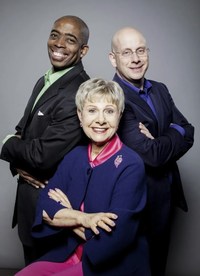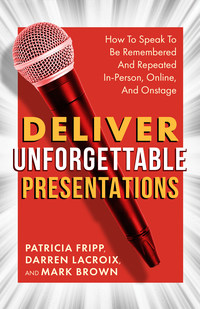SAN FRANCISCO, Sept. 13, 2022 /PRNewswire/ — Whether you’re talking to one person or 100, you want to connect with your audience in less than one minute if you want to be remembered and repeated.
“You have 30 seconds to immediately command the attention of your audience. Don’t waste it,” says Patricia Fripp, coauthor with Darren LaCroix and Mark Brown of the book Deliver Unforgettable Presentations: How To Speak To Be Remembered And Repeated In-Person, Online And Onstage (2022, Indie Books International).
Fripp is past president of the National Speakers Association and LaCroix and Brown are both past Toastmasters World Champions of Public Speaking.
The authors agree at the beginning of a speech, presentation, seminar, client meeting, report to senior management, sales presentation, or any manner of presentation you deliver, you need to arouse interest in the subject. That means a strong opening.
“The purpose of your opening is twofold: to get the audience’s attention and to make an indelible connection,” advises Brown. “Ideally, a strong opening establishes a link to your audience and your subject.”
Whatever opening you choose, make sure it transitions into your premise. Here are some possibilities excerpted from the book:
A Story. This is always an audience pleaser. Consider using a story of overcoming a challenge or adversity or of a situation where a mentor showed you the way.
Interesting Statistics or Little-Known Facts. If possible, start with an interesting statistic or little-known fact. No doubt you have several within your presentation. Bring one into the opening and add an emotion before it, “Would it interest/surprise/amaze you to know…”
A Powerful Quotation. The authors recommend you use quotes from influencers in your own life, such as your parents, coach, or first boss. You never want to flavor the opening with the idea, “I have heard this before; nothing in this talk is likely to be new.”
A Question. If you ask a question such as, “Have you ever stood up to speak and forgotten what you wanted to say?” the most likely answer would be nods from the audience. The next time you ask this type of question, change it to “How often have you…?” The assumption is more than once, it will happen again, and your message becomes more urgent.
A Rhetorical Question. This is asked for effect, with no answer expected. “If I were to ask you…” Be aware of the possibility that someone will answer. Be ready to respond and move on.
A Challenge. A challenge is expected after your presentation. You may also want to start with a challenge for your audience to take action, give them information to be in a position to take action, and restate your challenge near the end.
Tie to the Headlines. News headlines are a simple way to make your prepared presentation appear to be spontaneous. Hold that day’s Wall Street Journal and ask, “Did you have time to read the Wall Street Journal this morning? The headline on page three ties directly to my presentation.”
Bold Claim or Big Promise. A bold claim could be, “In the next two hours, you will learn more about presentation skills than in your four years at college.” Of course, if you make a bold claim, you must be able to meet that claim and exceed the audience’s expectations.
Read a Letter, Email, or Review. Whenever you receive a complimentary letter, email, or magazine article, no doubt you want to ask yourself, “Is there a way I could use this in the opening of a presentation?”
Compliment the Audience. Find something praiseworthy about your audience and deliver it with sincerity. Fripp helped a marketing executive to create this opening: “What a magnificent opportunity to present the marketing tool kit to the best sales team in the pharmaceutical industry. You spoke, we listened, and we are about to unveil the results of your request.”
Relevant Humor. A joke is risky because of the high probability that your audience has heard it before, even if it’s funny. LaCroix says “We recommend that you uncover humor in a real-life story and make it funnier with exaggeration. At the meeting, you may see, hear, or experience a funny situation that everyone is aware of.”
Speaking of the opening options, Fripp says: “Certain speech openings captivate, mystify, and create an emotional bond that keeps an audience in the palm of the speaker’s hand.”
About Indie Books International
Indie Books International (www.indiebooksintl.com) serves as an independent publishing alternative to help agencies, business coaches and consultants create impact and influence. Indie Books offers no-cost strategy calls to prospective authors and no-cost strategy calls to current authors.
Contact
Henry DeVries
344139@email4pr.com
619-540-3031
SOURCE Patricia Fripp



